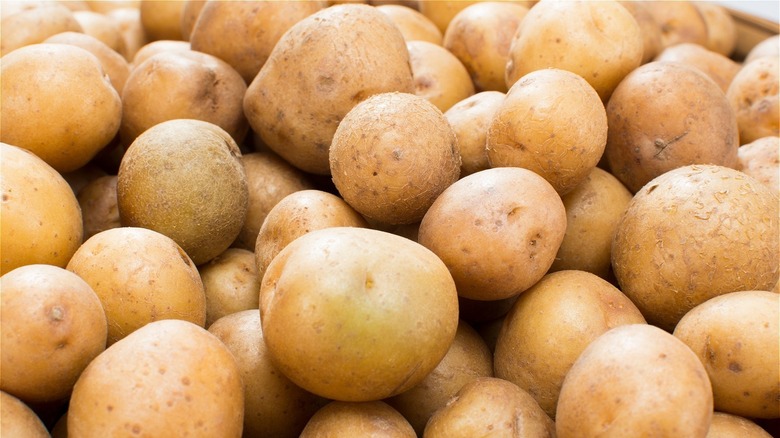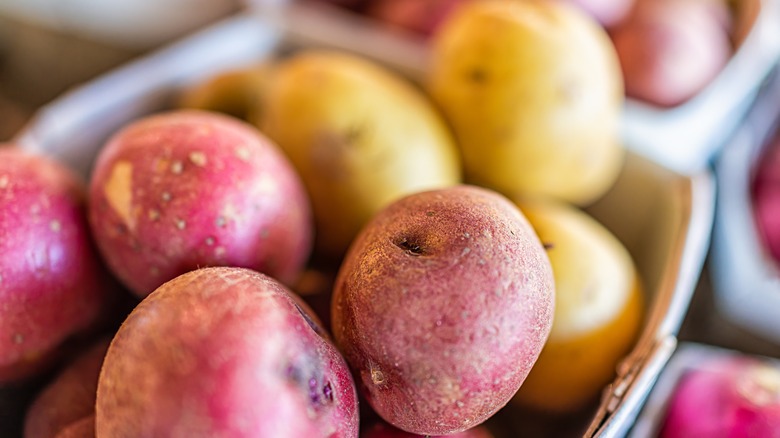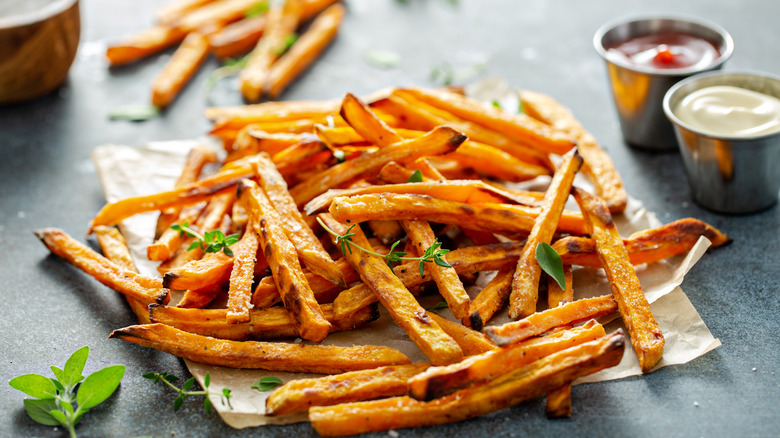Should You Wash Potatoes Before Cooking Them?
Potatoes – the iconic tuber and the prized produce of the state of Idaho — are the staple starch for many people, making its mark on nearly any plate, whether that be via french fries, mashed potatoes, roasted potatoes, gnocchi, latkes, or any of its many other iterations. While most are certainly adherents of potatoes in all of their permutations, there is one thing that some potato fans disagree on: scrub versus wash versus do nothing. Read ahead to get into the nitty-gritty of what the experts recommend.
Britanny Saunier, the executive director of Partnership for Food Safety Education, spoke with Southern Living and told them that "every fresh produce item should be rinsed unless it's in a package that states the item has been pre-washed," further noting that all that's needed for a proper wash is water — and nothing else. Saunier also claims that even if the potatoes are peeled, it's still wise to wash them well because "bacteria on the potato skins can transfer to your peeler or knife, which could end up on the parts of the potatoes you are consuming." In addition, it can be a good move to use a clean scrubbing brush prior to peeling.
How to properly wash and prepare potatoes
Simply Recipes notes that potatoes are one of the most pesticide-contaminated forms of produce, even if it's organic, so ensuring that the potato is both washed and scrubbed prior to peeling is very important. Simply Recipes also states that the "eyes" or sprouts on potatoes don't have to be removed, but if they're larger or more substantial, it's good to remove them. Nutritionally, the peels are great (and can crisp up beautifully in recipes like Loaded Potato Skins), but if you're looking for the cleanest potato dish, certainly peel them. Furthermore, some potatoes are naturally thin-skinned, so definitely don't need to be peeled. Doing so will be an exercise in futility, anyway, since the thin skin will just pull off flesh as you attempt to peel. Lastly, always be sure to cover your potatoes with cold water after peeling, or conversely, don't peel them at all until just before you're ready to cook.
Springs Bargains touts a special towel that can act both as a drying element and a scrubbing element for most potatoes, such as Idaho or russet. Win-win — and no need for a scrub brush.
Also, don't forget to wash your hands well! Doing all of this work to clean, scrub, and peel your potatoes will all be for naught if you're doing so with contaminated hands.
Final takeaways on potato preparation
Some outlets like Cooking Chops argue for washing potatoes in a dishwasher, but one important note about that is that it should be fully cleaned of any sort of soap or detergent, or you may have a particularly acrid-tasting potato (and some post-dinner stomach pains). If you're opposed to washing by hand, for some reason, though, then dishwasher-washed-potatoes are fine; just ensure you're only using cold water and — just to reiterate — there is not a scintilla of soap or detergent in that dishwasher prior to loading it chock-full of potatoes.
The Idaho Potato Commission states that scrubbing is necessary in order to remove any especially persistent dirt or "eyes" of the potatoes and that it's important to dry your potatoes after washing them, too. Although certain outlets also call for soaking in addition to scrubbing and peeling, for most potato varieties and recipes/dishes, a thorough, 20- to 30-second wash should be more than enough.
These tips and tricks also go for sweet potatoes and yams, and, as a last note, do not refrigerate your potatoes. Just store them in a cool, dry place. Follow these methods to ensure that your potato-centric dinners, snacks, sides, and appetizers are in tip-top shape and taste as terrific as all potato dishes should.


